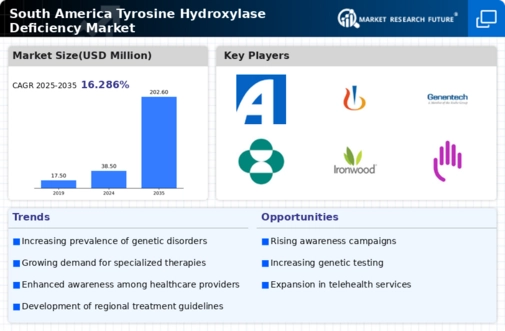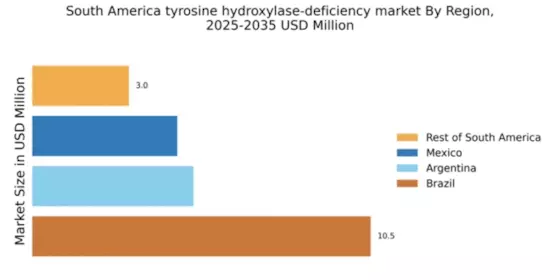Enhanced Diagnostic Capabilities
The improvement of diagnostic capabilities in South America is expected to significantly impact the tyrosine hydroxylase-deficiency market. Advances in genetic testing and biomarker identification have made it easier to diagnose this rare condition accurately and promptly. As healthcare providers become more adept at recognizing the symptoms and underlying genetic factors associated with tyrosine hydroxylase deficiency, the number of diagnosed cases is likely to increase. This trend may lead to a greater demand for treatment options and support services within the tyrosine hydroxylase-deficiency market. Furthermore, early diagnosis can facilitate timely interventions, potentially improving patient outcomes and quality of life.
Government Initiatives and Funding
Government initiatives aimed at improving healthcare access and funding for rare diseases are likely to play a crucial role in the tyrosine hydroxylase-deficiency market. In South America, various governments have begun to allocate resources towards the treatment of rare genetic disorders, which includes tyrosine hydroxylase deficiency. For instance, funding programs may provide financial support for research, treatment, and patient care, thereby enhancing the overall market landscape. The tyrosine hydroxylase-deficiency market could see increased collaboration between public and private sectors, leading to innovative solutions and improved patient outcomes. This financial backing may also encourage pharmaceutical companies to invest in the development of new therapies, further driving market expansion.
Rising Incidence of Neurological Disorders
The increasing prevalence of neurological disorders in South America appears to be a significant driver for the tyrosine hydroxylase-deficiency market. Recent studies indicate that the incidence of such disorders is on the rise, with estimates suggesting that approximately 1 in 10,000 individuals may be affected by tyrosine hydroxylase deficiency. This growing patient population necessitates enhanced healthcare services and treatment options, thereby stimulating market growth. The tyrosine hydroxylase-deficiency market is likely to benefit from this trend as healthcare providers seek to address the needs of affected individuals. Furthermore, the demand for specialized care and therapies is expected to increase, potentially leading to a surge in investments in research and development within the region.
Rising Patient Advocacy and Support Groups
The emergence of patient advocacy and support groups in South America is likely to influence the tyrosine hydroxylase-deficiency market positively. These organizations play a vital role in raising awareness about rare diseases, including tyrosine hydroxylase deficiency, and advocating for better healthcare policies. By providing resources, education, and support to affected individuals and their families, these groups can help to foster a more informed patient population. The tyrosine hydroxylase-deficiency market may experience growth as a result of increased awareness, leading to higher demand for treatments and services. Additionally, these advocacy efforts can encourage collaboration between stakeholders, including healthcare providers, researchers, and policymakers, ultimately benefiting the overall market landscape.
Growing Research and Development Activities
The surge in research and development activities focused on rare genetic disorders is another key driver for the tyrosine hydroxylase-deficiency market. In South America, academic institutions and biotech companies are increasingly engaged in studies aimed at understanding the underlying mechanisms of tyrosine hydroxylase deficiency. This research is crucial for the development of targeted therapies and diagnostic tools. The tyrosine hydroxylase-deficiency market is likely to benefit from these advancements, as new findings could lead to innovative treatment options. Moreover, increased collaboration between researchers and healthcare providers may facilitate the translation of scientific discoveries into clinical applications, potentially improving patient care and outcomes.


















Leave a Comment